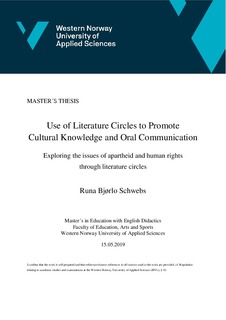| dc.description.abstract | The present master thesis explores how the literature circle method may be integrated in 10th grade EFL teaching to foster the understanding of human rights issues and apartheid in South Africa.
The English subject curriculum has increased focus on intercultural awareness and competence. Bearing this in mind, the thesis proposes the following main research question: How can literature circles promote student discussion and reflection upon intercultural and social issues in the EFL classroom? This question is specified by three sub-questions, all related to the reading of the picturebook The Soccer Fence: (1) How can literature circles help students develop intercultural awareness by reading and discussing a book on apartheid? (2) How can literature circles promote oral student discussion? (3) How does the picturebook medium serve as a basis for student discussions in literature circles?
A qualitative approach was chosen to obtain the data. The main data sources consisted of transcriptions of discussions of two student groups taking part in a literature circle project, that is small student-led discussion groups sharing reading experiences. Additionally a questionnaire on how the students’ experienced the use of literature circles was conducted. Moreover, the data included interviews with two teachers who used this method.
The study finds that the students’ intercultural competence is strengthened through literature circles. The students help each other acquire knowledge about the South African society, and they engage in the life experiences of the book’s protagonist. The students share their readings, exchange opinions and use relevant vocabulary. Thus the discussion seems to promote their oral competence, and having a picturebook as a basis, their multimodal competence is improved, too. The findings also show that teachers as well as students think that the literature circle method increases motivation and variation when working with human rights and apartheid issues. However, the study also finds that the students need teacher support, like prepared discussion questions, in order activate critical thinking on intercultural issues. | nb_NO |

